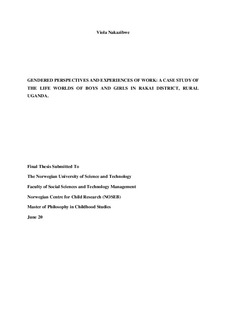| dc.description.abstract | Although children’s work has been much researched in Africa, the complex ways in which the
intersection of culture and gender shapes the type of work children do is less understood within
childhood studies. The main aim of this research was to explore the gendered perspectives and
experiences of work identifying the type, duration and range of productive and reproductive
work children perform, and exploring how the societal perspectives and attitudes towards
gendered social roles shape children’s work in rural Uganda. More concretely, the study
achieves the following interrelated objectives; a) to explore family and societal expectations
from the children, b) to find out the different work roles or tasks performed by children, c) how
the community in Rakai perceive children’s contributions towards the community and d) to
explore how girls and boys combine work, play and leisure.
Semi structured interviews, focused group discussions, field notes and documentation, recall,
dairies and archival record were used. Snowballing and purposive sampling were used to
recruit participants. Qualitative methods were used to collect the data as a way to encourage
participants to freely express their views. The study was rooted in the sociology of childhood
which acknowledges children as social actors rather than the traditional perception of them
being inadequate, incompetent and dependant. Right based approach was adopted in order to
position working children in Rakai as rights holders, as well as a gender approach which
identify children in the social interactions and societal values based on their perspectives and
experiences as well as those of their guardians.
The study found out that children believed that they make substantial work contributions to the
rural production and reproduction both independently and along adults. The community
believed that children’s work is vital to both the households and the community and cannot be
separated from that of their family’s survival as there is interdependency between children and
the elders of the community. The existence of female headed household has increased the
enrolment of children into work as the need arises to support their households thus giving birth
to expectations that translates into work. Erosion of traditional livelihoods has led to the loss
of children’s informal socialisation practises at work, and there is integration of work, play and
leisure by the children while strategizing ways of making the three aspects go hand in hand.
Fostered children form a special category in rural Uganda and they are quite numerous but their
perspective was not studied. The study therefore recommendations specific research to explore
their experiences and perspectives. This is because the study questions the implications of
fostering as a way to ensure children’s bright future. | nb_NO |
